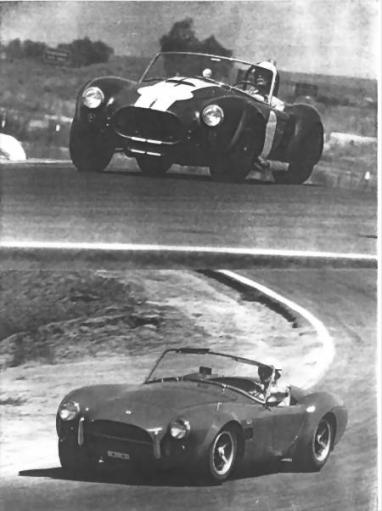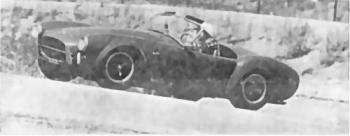| During practice we made it a habit to glance nervously in the mirror
when coming out onto a straight. If what we saw in the glass was blue with
white stripes (or red) we moved over right now, due to the fact that whatever
it was, was going to overtake right now. On one occasion we looked in the
mirror, saw something blue with white stripes. We moved over and waited,
and waited, and waited. We waited until we got about two thirds of the way
down the straight. Suddenly there was this godawful explosive roar and our
car picked itself up and set itself down at what felt like about three feet
to the right. So thing blue with white stripes disappearing around the next
turn. Ahrrgh!
The next question was if he going so bloody fast why did it take him so blasted long to get there? We found out the answer later. Every time Ken rounded a bend and headed down a straight the beast just sat and scratched until, eventually, it caught a bite, at which point everything was peachy keen until the next turn. So much for history; suffice it to say that the debuts of both cars, his and ours, were somewhat less than satisfactory. Tires available at the time and the buggy spring suspension of the older Cobra just weren't up to handling the 480-odd Percherons that lived under the hood. It also got more than somewhat warm in the cockpit. |
 |
|
The second appearance of this monster, widened, beefed, vented and with
much bigger tires was Nassau '64. It still had buggy springs but not much
else was the same. It went like the hammers and was only beaten, and just,
by a lightweight CS Sting Ray in the hands of Roger Penske, and then only
because some chassis bits broke up and Ken had to slow down.
We thought it still had to be only an exercise and something to keep the Shelby competition department busy till odd off moments. Surely ol' Shel wasn't actually planning to build 100 of these brutes and turn them loose on the body politic? He for dadburn sure was! Fun is fun, but Shelby wasn't spending loot sending that brute around to odd parts of the world just for the kicks of seeing Miles stuff his hoof into more horsepower than most people use in a lifetime. If the car was going to qualify for SCCA production racing he had to abide by the rules and build street machines. One full hundred of them. By this time Miles and Jim Benavides the project engineer had decided that this could not be just a mod job on the older 289. It had to look like a Cobra I, but that was about all. So they started with a relatively clean sheet of paper and built a new car. |
||||||||||


